Report on Planet Three by Arthur C. Clarke

Author:Arthur C. Clarke
Language: eng
Format: mobi, epub
ISBN: 9780575121850
Publisher: Orion
Published: 2011-09-29T03:00:00+00:00
Perhaps we can now glimpse one viable future for the human race, when it is no longer the dominant species on this planet. As he was in the begnning, man will again be a fairly rare animal, and probably a nomadic one. There will be a few towns in places of unusual beauty or historical interest, but even these may be temporary or seasonal. Most homes will be completely self-contained and mobile, so that they can move to any spot on Earth within twenty-four hours.
The land areas of the planet will have largely reverted to wilderness; they will be much richer in life forms (and much more dangerous) than today. All adolescents will spend part of their youth in this vast biological reserve, so that they never suffer from that estrangement from nature which is one of the curses of our civilization.
And somewhere in the background—perhaps in the depths of the sea, perhaps orbiting beyond the ionosphere—will be the culture of the ultraintelligent machines, going its own unfathomable way. The societies of man and machine will interact continuously but lightly; there will be no areas of conflict, and few emergencies, except geological ones (and those would be fully foreseeable). In one sense, for which we may be thankful, history will have come to an end.
All the knowledge possessed by the machines will be available to mankind, though much of it may not be understandable. There is no reason why this should give our descendants an inferiority complex; a few steps into the New York Public Library can do that just as well, even today. Our prime goal will no longer be to discover but to understand and to enjoy.
Would the coexistence of man and machine be stable? I see no reason why it should not be, at least for many centuries. A remote analogy of this kind of dual culture—one society encapsulated in another—may be found among the Amish of Pennsylvania. Here is a self-contained agricultural society, which has deliberately rejected much of the surrounding values and technology, yet is exceedingly prosperous and biologically successful. The Amish, and similar groups, are well worth careful study; they may show us how to get along with a more complex society which perhaps we cannot comprehend, even if we wish to.
For in the long run, our mechanical offspring will pass on to goals that will be wholly incomprehensible to us; it has been suggested that when this time comes, they will head on out into galactic space looking for new frontiers, leaving us once more the masters (perhaps reluctant ones) of the Solar System, and not at all happy at having to run our own affairs.
That is one possibility. Another has been summed up, once and for all, in the most famous short science-fiction story of our age. It was written by Frederic Brown almost twenty years ago, and it is high time that he received credit from the journalists who endlessly rediscover and quote him.
Fred Brown’s story—as you have probably guessed—is the
Download
This site does not store any files on its server. We only index and link to content provided by other sites. Please contact the content providers to delete copyright contents if any and email us, we'll remove relevant links or contents immediately.
| Aerodynamics | Aircraft Design & Construction |
| Astronautics & Space Flight | Avionics |
| Gas Dynamics | Propulsion Technology |
Whiskies Galore by Ian Buxton(40332)
Introduction to Aircraft Design (Cambridge Aerospace Series) by John P. Fielding(32338)
Small Unmanned Fixed-wing Aircraft Design by Andrew J. Keane Andras Sobester James P. Scanlan & András Sóbester & James P. Scanlan(32141)
Craft Beer for the Homebrewer by Michael Agnew(17446)
Turbulence by E. J. Noyes(7039)
The Complete Stick Figure Physics Tutorials by Allen Sarah(6638)
Kaplan MCAT General Chemistry Review by Kaplan(6054)
The Thirst by Nesbo Jo(5785)
Bad Blood by John Carreyrou(5769)
Learning SQL by Alan Beaulieu(5412)
Weapons of Math Destruction by Cathy O'Neil(5037)
Man-made Catastrophes and Risk Information Concealment by Dmitry Chernov & Didier Sornette(4736)
iGen by Jean M. Twenge(4702)
Digital Minimalism by Cal Newport;(4542)
Life 3.0: Being Human in the Age of Artificial Intelligence by Tegmark Max(4507)
Audition by Ryu Murakami(4099)
1,001 ASVAB Practice Questions For Dummies by Powers Rod(4038)
Electronic Devices & Circuits by Jacob Millman & Christos C. Halkias(4027)
Pale Blue Dot by Carl Sagan(4001)
